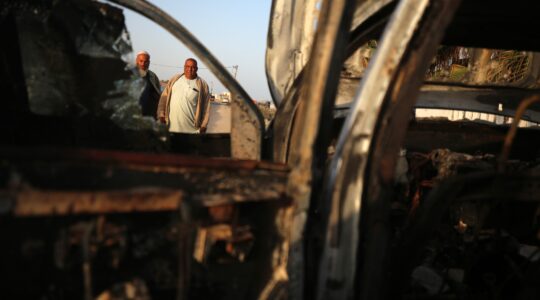JERUSALEM, Dec. 23 (JTA) — The commander of Israeli troops that unified Jerusalem during the 1967 Six-Day War has died at the age of 72. Reserve Maj. Gen. Uzi Narkiss, who died in Jerusalem last week, had an army career that dated back to the days of the Palmach, the elite commando units of the Haganah, which was the precursor to the Israel Defense Force. His photograph, striding along beside Defense Minister Moshe Dayan and IDF Chief of Staff Yitzhak Rabin as they entered the Old City of Jerusalem through the Jaffa Gate on June 7, 1967, has become one of Israel’s best-known images. Narkiss’ persona bubbled forth in even the briefest encounters: his bluff, backslapping style; his clipped, forthright speech; his incisive analysis; and, above all, his warm personality. Born in 1925, Narkiss enlisted in the Palmach in 1941 and rose through its ranks to serve as a commander during the Israeli War of Independence, when he fought to defend Jerusalem. In 1958, he was appointed military attache to Western Europe. Narkiss subsequently founded the Israeli National Defense College and served as its first commander. His distinguished career in the IDF reached its zenith during the Six- Day War, when he was head of the Central Command, whose forces restored Jerusalem to Israeli control. After retiring from the IDF, Narkiss served as director of the Immigration and Absorption Department of the Jewish Agency for Israel. While at the Jewish Agency, he contributed both his prestige and his organizational ability to enhancing and absorbing the wave of olim from the West that followed the Six-Day War. During the 1970s and 1980s, he was chairman of the Information Department of the World Zionist Organization. In that position, he worked to rescind the U.N. resolution that equated Zionism with racism. He served as head of the WZO’s North American delegation until 1994, when he returned to Israel to serve as chairman of the Israel Government Coins and Medals Corp. Narkiss was the author of two books, “The Liberation of Jerusalem” and “A Soldier of Jerusalem.” Narkiss, who was laid to rest last Friday, is survived by his wife, Esther; a son, Tzachi; two daughters, Ruthy and Tamy; and nine grandchildren.
Uzi Narkiss, a central figure in liberating Jerusalem, dies
Advertisement





